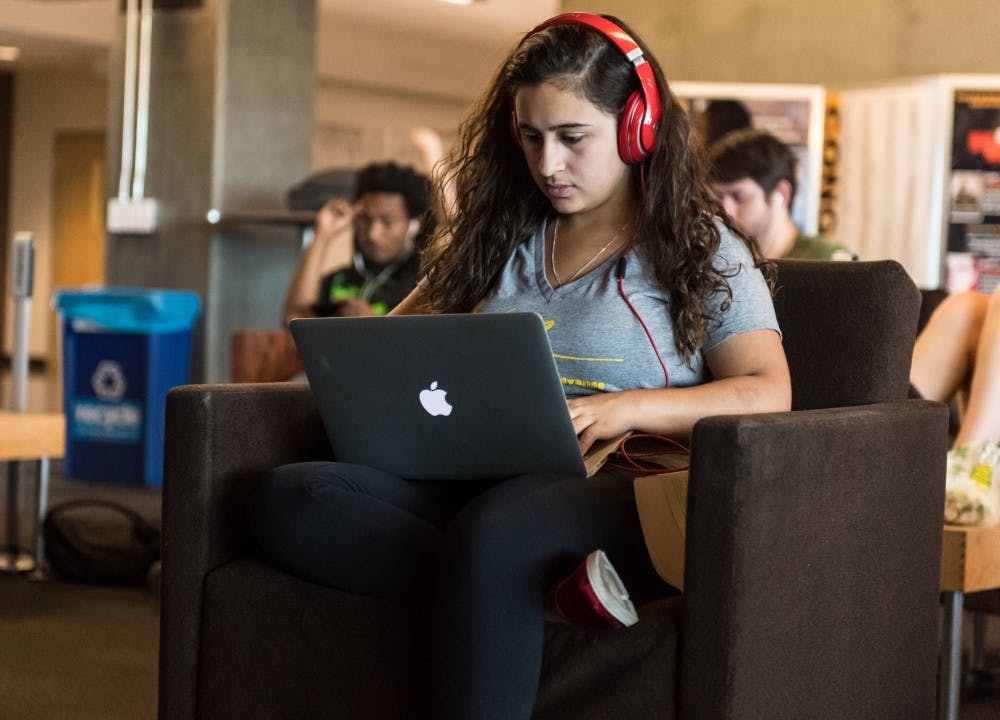Typically, students are of legal age before starting college, but two ASU students defy the odds as they meet the challenges of higher education sooner than most.
Ariana Bustos, a journalism student, started her sophomore year just before she turned 17.
After elementary school in 2011, young Bustos took an IQ test and interviewed with the Herberger Young Scholars Academy.
Javier Urcuyo, a math and biology student, started his sophomore year when he was 16-years-old. He skipped kindergarten and took multi-age classes from third grade until he graduated high school before also entering the Herberger Academy.
“Since we were the first graduating class, we were kind of the guinea pigs,” Urcuyo said.
Their accelerated path consisted of only one year of middle school. Then, they had a combined high school curriculum, meaning it was condensed down to only two years with an extra year for A levels. This is the Cambridge equivalent to Advanced Placement, or AP. Both enrolled at ASU at the age of 15.
“I know a lot of people were like ‘Oh my God, you’re only fifteen?’" Bustos said. "But nobody really noticed unless I said anything, and when I came in, I felt pretty prepared and doing better in college than I did in high school. I like it better. I like that I get to choose all my classes.”
However, neither Ariana Bustos nor Javier Urcuyo lived on campus during their freshman years.
“I would be a fifteen-year-old kid going into the dorms with 18- to 19-year-olds," Bustos said. "(My parents) were kind of iffy about that. And I was like, ‘Okay fine, I won’t go, and we’ll see whether or not I can make friends in other ways.’"
Another obstacle students under 18 years of age encounter is completing an ASU House License Agreement with a signature from the parent.
“The Housing Operations team personally follows up with a student and their parent or guardian who would be under the age of 16 upon moving into their residential college,” Kerensa Williams, the director of strategic initiatives in University Housing, said. She also described that living at home is usually a preferred option for younger students.
“Honestly, it saved me a lot of money not to be in the dorms because I was so young," Urcuyo said. "I was too young to live in the dorms. So, I commuted the first year, but I still spent a lot of time on campus.
"I put myself out there because I knew I had to be very involved. A lot of commuters just spend their time like ‘okay go to class, and that’s it.’ And you’re not going to get the full college experience that way.”
On the bright side, Bustos and Urcuyo were not alone. Because the Herberger Academy had an affiliation with ASU, some of their friends came from their school into the University.
“They’re on the Tempe campus, so anytime I wanted to go out with friends or do something, then I’d go to Tempe," Bustos said. "But overall, I was pretty much just working on school and coming here for classes downtown (Phoenix).”
Sophomore year greatly contrasted freshman year because now Bustos lives in the residence hall. Bustos is now surrounded by people; therefore, she can join more organizations like ASU's Blaze Radio Station because now she doesn’t have to deal with the inefficiency that would come from staying in downtown Phoenix all day just to participate.
“I’m on the freshman floor, so I’m closer in age to everybody," Bustos said. "I’m turning 17 soon. Seventeen to 18 and 19 is a way closer age difference than 15 to 18 or 19. Of course, it’s kind of funny that whenever I say ‘oh yeah, I’m a 16-year-old and in college,’ people are shocked.
"Then I’m like, ‘but I’m also a sophomore.’ And they’re like ‘Oh my God, I can’t believe you’re 16 and a sophomore.'"
But, other than when she tells people about her age, she didn’t feel the age gap freshman or sophomore year.
Urcuyo told a story about a recent chemistry lab where his lab partners could not believe his age.
“My lab partners didn’t know how old I was, and they asked," Urcuyo said. "When I said 16, they were like ‘are you joking? You don’t seem 16.’ I’m at the maturity level of college students. I spend a majority of my time with college students.
"So I don’t think they believed me at first just because it’s not really common. I don’t act like I’m 16."
Busto’s fast-tracked plan for success didn’t end when she graduated high school. She plans to take 18 or more credit hours each semester to graduate a semester or a year early.
But, graduating college does not satisfy Ariana Busto’s overachieving nature. She continues to ponder the idea of law school which takes three additional years of schooling. But, once she graduates, she will only be 21 years of age.
Bustos ended with this note: “I actually think it’s much easier to blend in than people think because if you’re mature, if you don’t act like you’re real young, people will forget that you’re younger. It’s not as crazy as people might think.”
Reach the reporter at anbuechl@asu.edu or follow @musicgeek613 on Twitter
Like The State Press on Facebook and follow @statepress on Twitter




